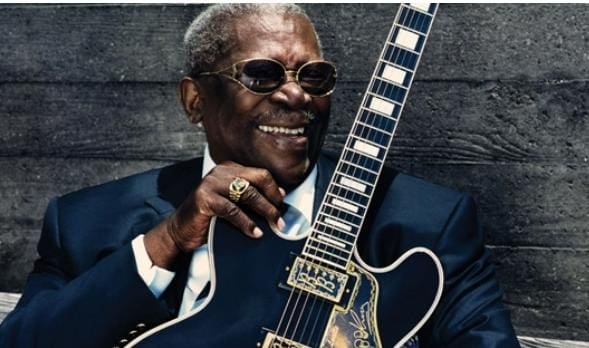B.B. King, born Riley B. King, was a highly influential American blues guitarist, singer, and songwriter. He was born on September 16, 1925, in Itta Bena, Mississippi, and passed away on May 14, 2015, in Las Vegas, Nevada. B.B. King is widely regarded as one of the greatest blues musicians of all time and is often referred to as “The King of the Blues.”
Throughout his career, B.B. King recorded numerous albums and performed thousands of concerts around the world. He was known for his expressive vocals, masterful guitar playing, and heartfelt delivery of blues music. King’s guitar, a Gibson ES-355 named “Lucille,” became an iconic symbol of his artistry.
B.B. King’s music blended traditional blues, jazz, and R&B influences, and his signature sound featured soulful guitar solos with precise phrasing and his signature “butterfly” vibrato technique. He had a unique ability to convey raw emotions through his music, and his songs often explored themes of love, heartbreak, and the African American experience.
B.B. King Facts
- B.B. King was born on September 16, 1925, in Itta Bena, Mississippi, United States.
- His birth name was Riley B. King, but he became widely known by his stage name, B.B. King. The “B.B.” stood for “Blues Boy.”
- King was primarily known for his mastery of the guitar, particularly his distinctive style of playing the electric guitar, which influenced countless musicians.
- He was a singer, songwriter, and performer, renowned for his expressive vocals and heartfelt delivery of blues music.
- B.B. King’s signature guitar was a Gibson ES-355, which he named “Lucille.” He would often refer to his guitars as Lucille, and he even titled many of his songs with that name.
- He recorded and released numerous albums throughout his career, including the famous “Live at the Regal” album, which is considered one of the greatest live blues recordings of all time.
- B.B. King achieved mainstream success with his 1970 hit song “The Thrill Is Gone,” which earned him a Grammy Award for Best Male R&B Vocal Performance.
- Over the years, he collaborated with a wide range of musicians from different genres, including Eric Clapton, U2, and Bonnie Raitt, among others.
- In 1987, B.B. King was inducted into the Rock and Roll Hall of Fame, solidifying his status as one of the most influential musicians in the history of blues and rock music.
- He received numerous accolades and awards throughout his career, including 15 Grammy Awards and a Grammy Lifetime Achievement Award.
- King was known for his captivating live performances, often engaging with his audience and showcasing his incredible guitar skills.
- He toured extensively, performing hundreds of shows around the world each year, well into his later years.
- B.B. King was dedicated to sharing his love for blues music and was passionate about preserving its legacy. He believed in the power of music to bring people together and bridge cultural divides.
- In addition to his music career, King was also a philanthropist, establishing the B.B. King Foundation to support music education and provide scholarships to aspiring musicians.
- He was a charismatic and beloved figure, known for his warm personality, kindness, and humility.
- King was recognized with honorary doctorates from numerous universities and received the Presidential Medal of Freedom in 2006, one of the highest civilian honors in the United States.
- He continued to perform and record music well into his 80s, demonstrating his unwavering dedication to his craft.
- B.B. King’s influence extended beyond the blues genre, impacting artists from various backgrounds, including rock, jazz, and soul.
- He passed away on May 14, 2015, at the age of 89, leaving behind a remarkable legacy that continues to inspire and shape the world of music.
- B.B. King’s contributions to blues music and his impact on the cultural landscape have solidified his status as one of the greatest musicians of all time, earning him the title “The King of the Blues.”
- B.B. King’s first hit song was “Three O’Clock Blues,” which topped the Billboard Rhythm & Blues chart in 1951.
- He performed an estimated 15,000 concerts during his career, traveling extensively and bringing his music to audiences around the world.
- B.B. King was known for his distinctive guitar-playing technique called the “butterfly vibrato,” characterized by a rapid fluttering motion of the fingers on the guitar strings.
- His famous guitar, Lucille, got its name from an incident early in his career when a venue caught fire during a performance. B.B. King ran back into the burning building to save his guitar, and later learned that the fight that broke out causing the fire was over a woman named Lucille.
- King was a dedicated advocate for racial equality and civil rights. He performed at benefit concerts and used his platform to raise awareness and support for the cause.
- He was awarded the National Medal of Arts by President George H. W. Bush in 1990.
- B.B. King was a prolific songwriter, having written or co-written numerous songs throughout his career, including “Every Day I Have the Blues” and “Sweet Little Angel.”
- He received a star on the Hollywood Walk of Fame in 1991.
- B.B. King’s influence reached beyond the music world. He appeared in films and TV shows, including a memorable guest appearance on the sitcom “Sanford and Son.”
- His autobiography, “Blues All Around Me,” was published in 1996, providing a firsthand account of his life, career, and the evolution of blues music.

